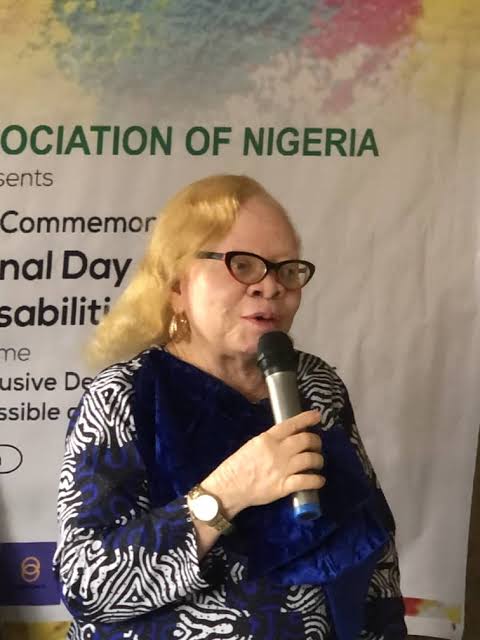Abuja, Nigeria – The National President of the Albinism Association of Nigeria (AAN), Dr. Mrs. Bisi Bamishe, has issued a passionate plea to the Nigerian government and other stakeholders to take immediate action in addressing the growing skin cancer crisis within the albinism community. In a heartfelt New Year message, Dr. Bamishe called for collective action to mitigate the devastating effects of skin cancer, which disproportionately affects individuals with albinism across the country.
Dr. Bamishe, who has long been an advocate for the rights and well-being of people with albinism, revealed a harrowing statistic: over 40 members of the albinism community are currently battling various stages of skin cancer, with many requiring expensive and painful treatments such as surgeries, chemotherapy, and radiotherapy. Tragically, 16 individuals have already lost their lives to the disease in the past year alone.
“Many of our members are enduring immense pain in various hospitals or confined to their homes, suffering in silence and isolation,” Dr. Bamishe lamented. “Skin cancer remains a critical health challenge for persons with albinism in Nigeria, and without immediate intervention, the situation may spiral out of control.”
In her emotional appeal, Dr. Bamishe urged the Nigerian government, corporate organizations, and the general public to come together in addressing this “silent killer.” She emphasized the urgent need for action, stating that the albinism community is facing an unprecedented crisis that could worsen without significant support.
“We, therefore, use this medium to make a heartfelt appeal to the government, fellow Nigerians, and development partners to come to our aid,” Dr. Bamishe said. “Your continued support can make a significant difference in addressing these challenges posed by this silent killer. This is a crisis that demands our immediate attention.”
The Silent Epidemic
Persons with albinism are highly susceptible to skin cancer due to the lack of melanin in their skin, which provides little protection from harmful ultraviolet (UV) rays. Exposure to the sun can result in painful and often deadly forms of skin cancer, including basal cell carcinoma, squamous cell carcinoma, and melanoma. For many individuals with albinism, especially in countries like Nigeria with intense sun exposure, the lack of access to vital protective measures exacerbates the risk.
In her message, Dr. Bamishe highlighted the need for immediate intervention to reduce the impact of the disease. “We urge the government, corporate organizations, and concerned citizens to provide essential resources such as sunscreens, UV-protective umbrellas, hats, and clothing to help prevent skin cancer among persons with albinism,” she urged. “Prevention is critical, and these basic resources can save lives.”
Dr. Bamishe also called for the establishment of more accessible treatment options for those already affected by skin cancer. She advocated for free or subsidized healthcare services for individuals with albinism, stressing that many in the community cannot afford the costly treatments required to combat the disease. “We cannot afford to wait any longer. Our people are suffering, and without urgent action, more lives will be lost,” she warned.
A Call for Awareness and Education
Alongside providing medical support, Dr. Bamishe emphasized the need for widespread awareness campaigns to educate the public about the dangers of skin cancer for persons with albinism. She urged that these campaigns be taken to schools, markets, religious gatherings, and the media, where they can reach a broad audience.
“Education is key in changing mindsets and ensuring that persons with albinism are better protected,” she said. “Raising awareness about the risks of sun exposure and the importance of prevention will help save lives and reduce the incidence of skin cancer in our community.”
Dr. Bamishe also called for the inclusion of albinism-related health education in school curricula to ensure that future generations are equipped with the knowledge to protect themselves and their peers.
Appreciation and Gratitude
In addition to making her urgent appeal, Dr. Bamishe took a moment to express gratitude to the Nigerian government, the Executive, Legislative, and Judiciary arms, and other development partners who have supported the Albinism Association of Nigeria’s efforts. She specifically thanked the Lagos State Government for its ongoing assistance and acknowledged the contributions of the Disability Rights Fund (DRF), the AAN’s Board of Trustees, and other philanthropists.
“I want to extend my heartfelt thanks to all who have supported us in 2024,” Dr. Bamishe said. “We are deeply grateful for your unwavering support and for helping us take steps toward improving the lives of persons with albinism in Nigeria.”
She also urged Nigerians to embrace a spirit of solidarity during the New Year, calling on citizens to extend a helping hand to the albinism community. “As we enter this season of renewal, I encourage all Nigerians to be a part of the solution,” Dr. Bamishe stated. “Together, we can create a future where every individual, regardless of their color or condition, can thrive and contribute meaningfully to society.”
A Call to Action
Dr. Bamishe’s message serves as a powerful reminder of the challenges faced by persons with albinism in Nigeria and the need for immediate action. The growing skin cancer crisis is not just a medical issue—it is a social issue that demands urgent attention from the government, healthcare providers, corporate organizations, and the public.
As the albinism community continues to face this devastating health crisis, Dr. Bamishe’s appeal underscores the importance of collective responsibility in ensuring the well-being of vulnerable populations. By taking swift and decisive action, Nigeria can make a significant difference in the lives of individuals with albinism, offering them the protection and support they need to survive and thrive.
This New Year, let us stand together to protect the lives of those who need it the most. The time to act is now.


